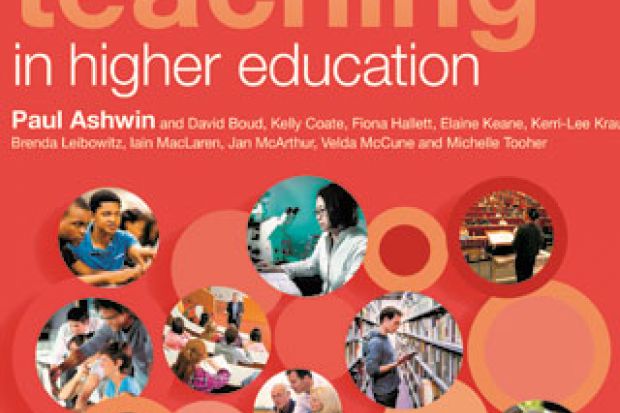If I were to describe this book in a sentence, I would say that it gives people outstanding advice on how to teach well, within highly complex organisations known as universities. Yet it is easy to forget that university teaching is not some sort of cheeky upstart, brought into being only in 2002 with Sir Gareth Roberts’ review, SET for Success, and its skills training money. Teaching is one of the original professions of the medieval university, proudly standing alongside the clergy, medicine and the law. And there’s the rub. Teaching, and with it the communication of knowledge and understanding, is the foundation stone of everything that we are supposed to believe in as academics. However, we are often advised to tread carefully when working to develop skills in this area, in case we are taken away from the “real” work of the institution, namely research (and very possibly quality assurance paperwork and visible committee membership as well).
Paul Ashwin and his co-authors challenge this view in setting out a vision for university teaching that accommodates such tensions very well. Based on 10 principles developed as part of the Economic and Social Research Council’s Teaching and Learning Research Programme, each chapter is framed in a way that provides a strong theoretical underpinning while introducing copious practical tasks. These tasks are at first sight suited to people on introductory teaching courses as part of their induction into a first university post, for example, but could also be used by lecturers further along in their teaching careers and looking to raise their game. Although I qualified as a teacher in the early 1990s and have been teaching ever since, I was able to benefit from the contents, and made quite a few notes as I read it, suggesting that there is plenty there for all readers.
The spread of subjects covered by the book is considerable, but as you read it, time flies. The first section deals with the process of becoming reflective, done entirely without introspective gush, for which the authors should be commended. We then move on to creating conditions for learning, with some particularly inspired passages relating to the role of online environments in teaching. Next the book deals with teaching for understanding, and it is here that issues of pedagogy are unpacked particularly well. In a section on reflecting on consequences, the sheer messiness of monitoring and improving teaching quality is dealt with nicely (we can only hope that certain people involved with the National Student Survey read it too). Finally, the section on deepening understanding sits very well within the structure of the book as a whole, enriching the other chapters and giving a longer-range perspective to the whole undertaking.
All that having been said, some of Reflective Teaching in Higher Education is perhaps a little worthy. The opening chapter reeks of tidiness and correctness, at the expense of communicating the sheer passion for teaching that permeates the rest of the volume. If there is a second edition, and I suspect there will be, I wonder if this might be rewritten to convey a greater sense of excitement. Similarly, I wonder if it is rather too gentle about the gendered nature of what we might call the emotional labour of teaching. Let me expand. The book’s section on kindness and leniency debates both sides of the argument reasonably competently. But for me it misses the elephant in the room exposed by research such as a 2014 study by Lillian MacNell, Adam Driscoll and Andrea Hunt (“What’s in a name? Exposing gender bias in student ratings of teaching”), namely the way that female lecturers are penalised if they are perceived as insufficiently “cuddly” towards students, which is something that takes a lot of time and effort to build. In contrast, men are seen as authority figures and allowed to be more instrumental in their approach towards teaching, which frees up more time and energy for research and career progression. We should forgive the authors these minor shortcomings, however. This collection is a real tour de force.
Reflective Teaching in Higher Education
By Paul Ashwin, David Boud, Kelly Coate et al
Bloomsbury, 432pp, £75.00 and £24.99
ISBN 9781441124463 and 197559
Published 26 February 2015
Register to continue
Why register?
- Registration is free and only takes a moment
- Once registered, you can read 3 articles a month
- Sign up for our newsletter
Subscribe
Or subscribe for unlimited access to:
- Unlimited access to news, views, insights & reviews
- Digital editions
- Digital access to THE’s university and college rankings analysis
Already registered or a current subscriber? Login





